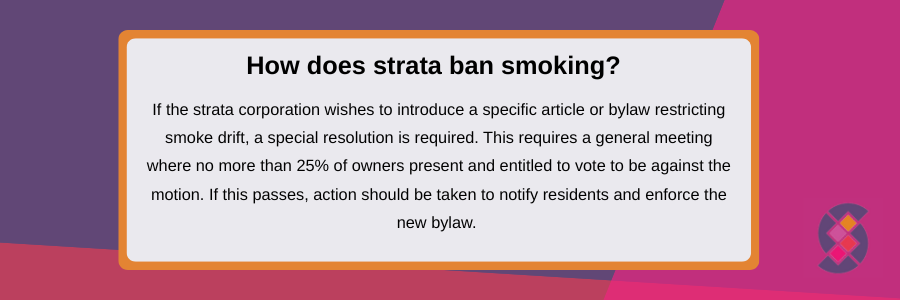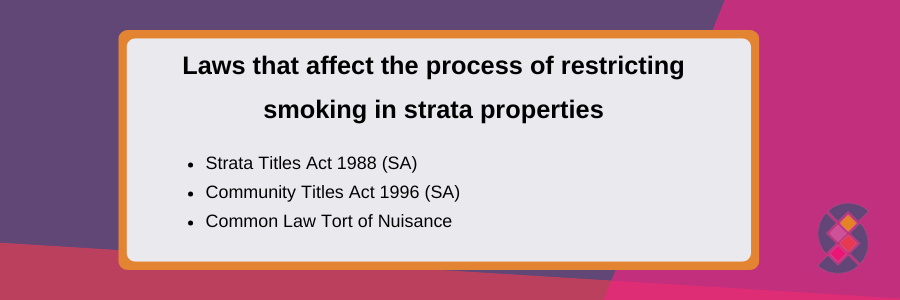Can Strata Ban Smoking?
With the risk of cardiovascular disease, lung cancer, and other lung diseases, possibly worsening illnesses like asthma and bronchitis, and an increased risk of relapse for ex-smokers – it isn’t hard to understand why more public and private areas are making smoking more prohibited.
The health effects of second-hand smoking have become increasingly well-known in recent years, and the government is making changes to ensure a safe and healthy environment for everyone.
So, what are the rules on smoking on a strata property? If a neighbour’s smoking habit is impacting your air quality, you can raise the issue with your strata corporation – but first, it’s essential to understand the laws and process in restricting smoking in strata properties.
Can strata ban smoking?
The short answer is no, strata cannot ban smoking in a strata property. However, strata corporations can regulate smoking in common areas and smoke drift to private property.
Some Australian states, such as New South Wales, Queensland, and Victoria, have specific laws in place to address smoking in strata properties, allowing proprietors to either make the property completely smoke-free or prohibit smoking.
In South Australia the legal framework is outlined below:
Strata Titles Act 1988 (SA)
The Strata Titles Act 1988 governs the management and administration of strata schemes in South Australia. Key sections relevant to smoke drift include:
Schedule 3 – 2(d): A person bound by these articles must not make, or allow his or her customers, clients or visitors to interfere, with others in the enjoyment of their rights in relation to units or common property.
It is therefore highly likely that this standard article is sufficient to enforce smoke drift nuisance.
Community Titles Act 1996 (SA)
The Community Titles Act 1996 governs the management and administration of community schemes in South Australia. Key sections relevant to smoke drift include:
Section 34(3)(c): A by-law may also regulate the use and enjoyment of community lots in order to prevent interference with the use and enjoyment of other lots.
It is highly likely that most community corporations will already have a by-law preventing nuisance that allows enforcement against smoke drift nuisance. In the unlikely event one does not already exist, a by-law can be created to do so.
The Community Titles Act also has a specific section that governs nuisance:
Section 133: An owner or occupier of a lot must not use, or permit the use of, the lot or the common property in a way that—
(a) causes a nuisance; or
(b) interferes unreasonably with the use or enjoyment of another lot or the common property by another person who is lawfully on the lot or common property.
Common Law Tort of Nuisance
It may be possible to regulate smoke drift through the common law tort of nuisance. This has been accepted in some interstate jurisdictions to include smoke drift.
Recent proposed amendments to strata legislation
On May 1 2024, amendments were proposed to the Strata Titles Act 1988 and the Community Titles Act 1996, addressing concerns regarding air quality. With the proposed amendments, strata corporations in South Australia can agree to make specific by-laws to regulate smoking of tobacco and related products on the shared common property and to prevent smoke drift from private lots onto other lots or common property
These proposed legislative amendments stem from section 167 of the Community Titles Act 1996, which tightened rules around smoke drift, classifying it as a ‘nuisance’ which affects common property. Under these new rules, strata corporations have the authority to make rules regarding the protection of fresh air.
What is common property?
Common property, also known as a common area, is a shared space between owners of the same strata building. It can include both exterior and interior areas that are not part of a private lot, such as rooms, paths, balconies, stairwells, gardens, fences, or other spaces where residents of the building regularly pass through or use. The strata corporation is typically responsible for managing, maintaining, and repairing common property in a strata building.
What is classified as a ‘nuisance’?
A nuisance is generally regarded as something that interferes with others’ use or enjoyment of their rights in relation to their unit or common property. It is now generally considered that smoke drift may constitute a nuisance.
What is smoke drift?
When a by-law prohibits smoke drift, it refers to any smoke that reaches and penetrates through common property or a neighbour’s private property (including a balcony or windows). This means that even if the smoker is in their private lot, if the smoke drifts through common airspace or a neighbour’s private airspace, it is considered a breach of the bylaw.

How does strata ban smoking?
If the strata corporation wishes to introduce a specific article or bylaw restricting smoke drift, a special resolution is required. This requires a general meeting where no more than 25% of owners present and entitled to vote to be against the motion. If this passes, action should be taken to notify residents and enforce the new bylaw.
Implementing any new article or bylaw in a strata community requires time, collaboration, and careful consideration. The proposal for a new bylaw or changes to the bylaw must address real concerns while adhering to the Strata Titles Act 1988 and the Community Titles Act 1996. It is for this reason that it is important to consult strata management experts to ensure all legal requirements are met, and enforcement of new articles or bylaws is implemented correctly.
What happens if someone doesn’t comply with a smoking ban in a strata property?
Once a bylaw is approved and implemented in a strata property, residents must comply or potentially face fines. If a resident breaches a bylaw, they may be sent a written warning. For repeated breaches, the resident may receive a fine or, in unresolved cases, be referred to a Court.
To report noncompliance with a smoking ban in a strata property, photo evidence or witness statements should be provided to the corporation.
How to address smoking concerns to your strata corporation?
If you believe your neighbour’s smoking is affecting your air quality, the first port of call is to talk with them. Your neighbour may not realise the impact of their smoke drift, and having a conversation about the impact of their smoking can resolve the issue quickly and without involving the strata corporation.
In the event that this conversation doesn’t end amicably, you may need to involve your strata corporation. From here, it is in the hands of your strata committee and corporation to deal with the issue and possibly pass a bylaw to specifically ban smoking in common property, or smoke drift into common property or private units and apartments.




